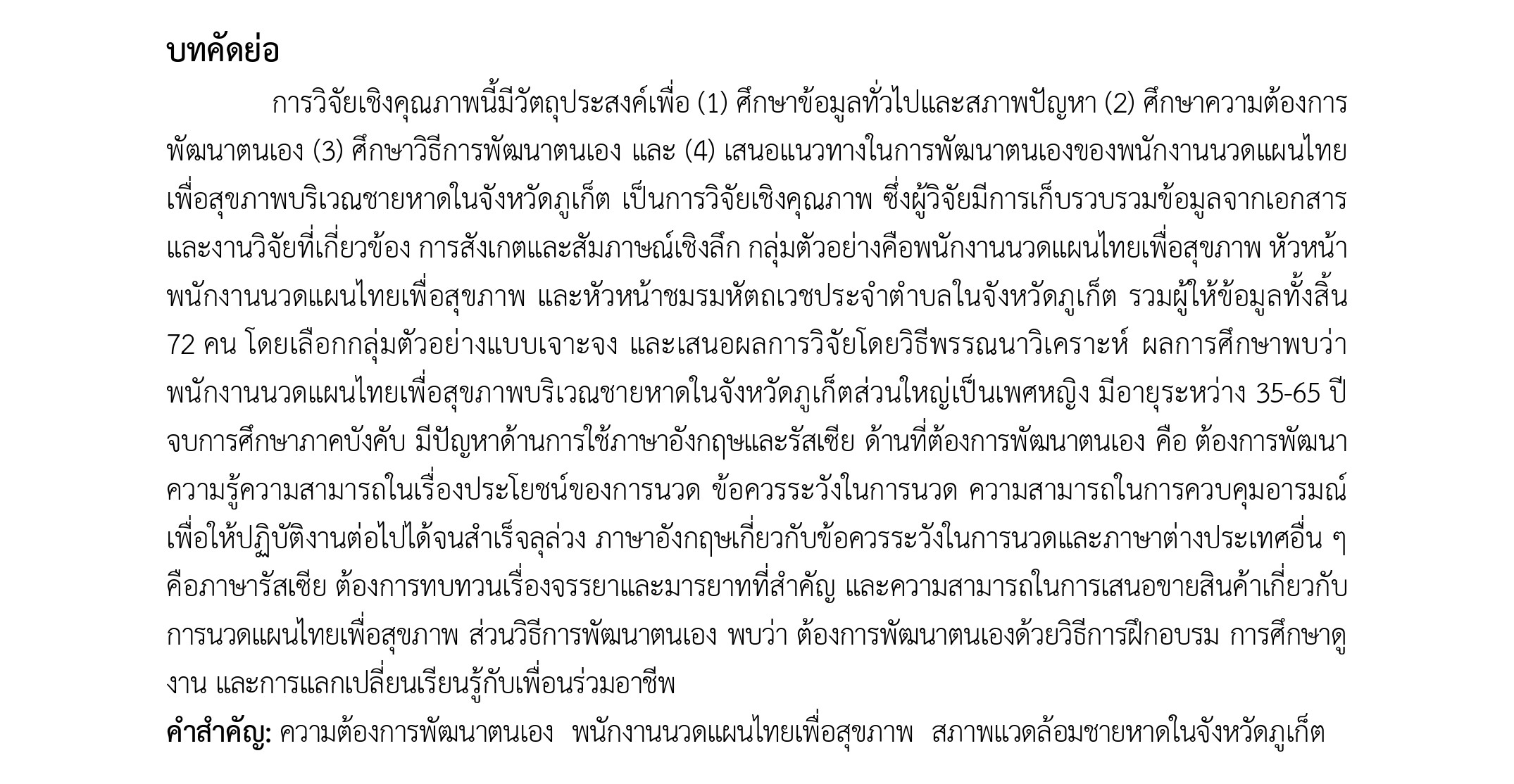Elevating Thai Massage Therapists’ Self Development Needs for Success on Phuket’s Beaches
DOI:
https://doi.org/10.14456/psruhss.2024.32Keywords:
Self-improvement needs, Thai massage therapists for health, Phuket beach environmentAbstract
This qualitative study examines the personal development needs of Thai massage therapists operating in the health-oriented beach context of Phuket. The research objectives include understanding the therapists' challenges, identifying their requirements for growth, exploring methods for personal development, and establishing a comprehensive guideline for their enhancement. Data collection involves in-depth observations and interviews, employing triangulation for rigor. The study involves 72 participants: experienced Thai massage therapists working on Phuket's beaches and the chief Thai massage therapist. Data analysis follows a descriptive analytical approach. The findings revealed that the therapists, often elderly among the aged of 35-65 years with massage experience, confront issues like language barriers and lack of professional licensing. Their developmental needs encompass improving their understanding of massage benefits, precautions, emotional management, language proficiency (especially English and Russian), ethical considerations, and product marketing. Personal development strategies include training, site visits, and peer learning. These approaches contribute to a holistic skill set enhancement.
References
จุฑานาฏ อ่อนฉ่ำ. (2561). การศึกษาองค์ความรู้การนวดไทย (ดุษฎีนิพนธ์ศึกษาศาสตรดุษฎีบัณฑิต). กรุงเทพฯ: มหาวิทยาลัยรังสิต.
ชนิญญา ชัยสุวรรณ, และทรงคุณ จันทจร. (2561). แนวทางการพัฒนาผู้ให้บริการนวดแผนไทยในสถานบริการสุขภาพของสมาคมแพทย์แผนไทยแห่งประเทศไทย. วารสารสันติศึกษาปริทรรศน์ มจร, 6(1), 188–199.
ชัญญนิษฐ์ อินทร. (2563). ปัญหาและความจำเป็นด้านการพัฒนาทักษะการสื่อสารภาษาอังกฤษในการทำงานของพนักงานธนาคารพาณิชย์แห่งหนึ่งในเขตเมืองพัทยา (วิทยานิพนธ์ปริญญามหาบัณฑิต). ชลบุรี: มหาวิทยาลัยบูรพา.
ธีรวดี ยิ่งมี, และมงคลชัย โพล้งศิริ. (2562). ความต้องการในการพัฒนาตนเองของบุคลากรสายสนับสนุนมหาวิทยาลัยเทคโนโลยีราชมงคลธัญบุรี. สืบค้น 15 มกราคม 2565, จาก http://www.repository.rmutt.ac.th/dspace/bitstream/123456789/3996/1/20220721-research-teeravadee.pdf
ประกาศจังหวัดภูเก็ต เรื่อง กำหนดมาตรการการบริหารจัดการชายหาดในเขตพื้นที่ จังหวัดภูเก็ต พ.ศ. 2558. (2558, 2 เมษายน). หน้า 1-2.
ปาณัท แลม, และรังสรรค์ เกียรติ์ภานนท์. (2564). การศึกษาสมรรถนะของผู้แทนขายเพื่อออกแบบแผนการพัฒนาสมรรถนะให้ส่งผลต่อการตัดสินใจซื้อของลูกค้าปลีกแบบดั้งเดิม. วารสารวิชาการมหาวิทยาลัยการจัดการและเทคโนโลยีอีสเทิร์น, 18(2), 170-184.
ภัชญาภา ทองใส, และคมสิทธิ์ สิทธิประการ. (2562). ปัญหาการสื่อสารภาษาอังกฤษสำหรับธุรกิจเพื่อการท่องเที่ยวท้องถิ่น อำเภอขนอม จังหวัดนครศรีธรรมราช. วารสารราชพฤกษ์, 17(3), 129-136.
ภาณิกานต์ คงวันทะ, และพิทักษ์ ศิริวงศ์. (2554). ปัจจัยที่มีอิทธิพลต่อการเลือกใช้บริการนวดแผนไทยของนักท่องเที่ยวชาวต่างชาติบนถนนข้าวสาร กรุงเทพมหานคร. ใน การประชุมวิชาการ มหาวิทยาลัยขอนแก่น ประจำปี 2554 (น. 328-335). นครปฐม: มหาวิทยาลัยศิลปากร.
ภูเก็ตจะรอด “ต้องพัฒนาเศรษฐกิจแนวใหม่” ดันท่องเที่ยวเชิงสุขภาพทำรายได้เพิ่มกว่า 46,000 ล้านบาท. (26 เมษายน 2564). ผู้จัดการออนไลน์. สืบค้นจาก https://mgronline.com/south/detail/9640000039470
มะสานูสี อาลี. (2562). ความต้องการพัฒนาตนเองตามมาตรฐานความรู้ของผู้ประกอบวิชาชีพครูในสถานศึกษา กลุ่มเครือข่ายมายอพัฒนา จังหวัดปัตตานี (วิทยานิพนธ์ปริญญามหาบัณฑิต). สงขลา: มหาวิทยาลัยทักษิณ.
สถาบันวิจัยเพื่อการพัฒนาประเทศไทย. (2564). วิเคราะห์ผลกระทบของโควิด-19 ต่อธุรกิจท่องเที่ยว. สืบค้น 4 กันยายน 2566, จาก https://tdri.or.th/2021/02/covid-112/
สำนักงานสาธารณสุขจังหวัดภูเก็ต. (2565). ภูเก็ตเมืองท่องเที่ยวเชิงสุขภาพระดับโลก. สืบค้น 4 กันยายน 2566, จาก https://www.phuket.go.th/webpk/file_data/plan2/4.MedicalWellnessHub.pdf

Downloads
Published
How to Cite
Issue
Section
License
Copyright (c) 2024 Humanities and Social Sciences Journal of Pibulsongkram Rajabhat University

This work is licensed under a Creative Commons Attribution-NonCommercial-NoDerivatives 4.0 International License.
Any articles or comments appearing in the Journal of Humanities and Social Sciences, Rajabhat Phibulsongkram University, are the intellectual property of the authors, and do not necessarily reflect the views of the editorial board. Published articles are copyrighted by the Journal of Humanities and Social Sciences, Rajabhat Phibulsongkram University.








